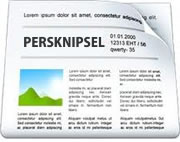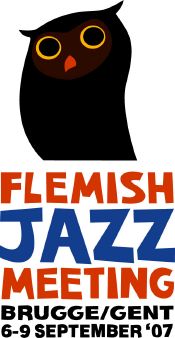European Jazz Leads the World
| Type: | opiniestuk |
|---|---|
| Auteur: | Stuart Nicholson |
| Bron | Weerklank forum |
| Bron: | Weerklank forum |
| Taal: | Engels |
| Raadpleegbaar: | niet raadpleegbaar in Muziekcentrum Vlaanderen |
Korte beschrijving
This article was written by jazz journalist Stuart Nicholson as a result of the second Flemish Jazz Meeting and the annual meeting of the European Jazz Network in Bruges and Ghent 2007.
Artikel
On Thursday, 6th September the Flemish Jazz Meeting opens in Bruges. An exciting initiative to promote Flemish jazz to the rest of the world, over 100 promoters and media representatives from across the EEU and from countries as diverse as Canada, Lithuania, Azerbaijan, the USA, Estonia and Turkey will gather for the four day event.Opening in the De Werf for two nights, the Meeting will move on to Ghent’s Vooruit on Saturday and wind-up back in Bruges on Sunday with a brunch concert. While
there are discussion forums during the day, the centrepiece of the event is thirteen concerts spread over three nights presenting some of the very best of Flemish jazz including the Jef Neve Trio, who are currently attracting an international following, Ben Sluijs and Mâäk’s Spirit,
The Meeting also hosts the annual conference of the European Jazz Network and the concert series will be of special interest to the Network’s members. They comprise jazz professionals responsible for promoting some of Europe’s major jazz events such as the London Jazz Festival, the Berlin Jazz Festival and Bergen’s famous Nattjazz Festival.
Originally set up with funding from the EEU Culture 2000 programme, the European Jazz Network (EJN) was formed to provide a greater voice for European jazz. Its membership, which has grown rapidly over the last few years, is dedicated to making more space for European jazz musicians on jazz festival rosters and club programmes.
The time is right for such an initiative. There is a gathering consensus among many European animators, jazz musicians and critics that European jazz is finally coming into its own. In the past most European jazz festivals were dominated by American headliners, with European jazz musicians filling out the lower slots. But that’s all changing – and fast.
After almost a century of regular shocks announcing the new, American jazz, in the words of one festival producer, seems to have “dead-ended.” With no musician emerging to lead it towards new horizons, as happened in the past with icons such as Louis Armstrong, Benny Goodman, Charlie Parker, Miles Davis, John Coltrane or Ornette Coleman, the main thrust of the music since the 1980s has been virtuosic recapitulation.
In contrast, European jazz has moved out from under the shadow of its American cousin and is impressing audiences with its adventure, originality and diversity. For many, Norwegian jazz has been at the forefront of this quiet revolution, indeed, a major feature in the UK broadsheet The Guardian a few months ago said that the capital of city of jazz was no longer New Orleans or New York but Oslo.
There is a certain sound that sets Norwegian jazz – and Scandinavian jazz – apart from the American approach known as the Nordic Tone. Described by the famous Norwegian bassist Arlid Andersen as a “Nordic kind of blues,” its pensive melancholy, intensity and less-is-more ethos sets it apart in the world of jazz.
But Norway is only one example of how jazz in Europe is being re-imagined by local musicians in ways that reflect their own culture.
In the Netherlands, for example, jazz musicians such as Han Bennik, Willem Breuker and the ICP Orchestra have developed a very distinctive style that reflects Holland’s culture – its colonial past, its classical traditions, its street organs and so on – that is quite different from, say, Andalusian musicians such as pianist Chano Dominguez, who incorporate flamenco into their jazz improvisations.
“Local” musicians such as these seek to create original music that is both part of a universal language of jazz and a singular expression of identity (often cultural identity). However for some, especially Americans, jazz played outside the “mother tongue” context of American styles is problematic.
While America likes to claim jazz as “an American music,” they forget how Opera, for example, was performed across Europe in the Italian style, often Opera Buffa or Commedia dell’arte, until the middle of the eighteenth century. Then composers such as Mozart, Gluck and Haydn re-imagined the form in their own distinctive ways. By the end of the nineteenth century Wagner in Germany and Berlioz in France were each approaching opera from their own very distinct perspective, but nobody would seriously argue that Die Walküre or Les Troyens were not somehow “opera” because they did not sound quintessentially “Italian.”
Equally, in Europe few seriously argue that for jazz to be considered jazz, it must be played in the hegemonic American styles. Just as the use of English throughout the world does not always mirror the vocabulary and rules of grammar and syntax followed by English speakers in Britain or America — such as “Singlish” in Singapore — there are jazz styles that have evolved outside the United States that do not necessarily follow the way that jazz is played inside the United States.
Nowhere in the world is this better illustrated than Europe, a small continent with a diversity of nation states where new “local” dialects of jazz have evolved as the music hybridises with local culture, folkloric forms, classical music and even local pop music – a process known as “glocalization – that is unique to a particular region or nation state.
The key point here is that the process that drives glocalization into existence, in language or in jazz, is the need for identity. In an era of political turmoil and complex negotiations of personal and cultural identity, we know that globalization destroys boundaries and in the process raises fears about the loss of our cultural anchors and identity. The increasing glocalization of jazz by the European jazz community is a response to this, providing a means for local musicians across Europe to assert their cultural identity and place within the music.
Coincidentally, this trend makes a perfect match for the EEU’s important Communication on a European Agenda for Culture in a Globalizing World. Paragraph 3 sets out three objectives – promotion of cultural diversity, promotion of culture as a catalyst for creativity and promotion of culture as a vital element in the Union’s relations. European jazz ticks each of these boxes, suggesting jazz should figure more strongly in the EEU’s cultural thinking.
Glocalized forms of jazz promote cultural diversity, jazz is quite obviously a catalyst for creativity while “glocalized” forms of jazz are already being used to promote European culture – in the Netherlands, for example, Dutch jazz has long been used as a tool of cultural diplomacy. As Ferdinand Dorsman, past Deputy Head of International Cultural Policy said, “The sort of things people associate with the Dutch are liberty, tolerance, a certain playfulness and not liking everything within certain limits and jazz is a good way of illustrating this…jazz as an instrument really links people.”
And at the Flanders Jazz Meeting this cultural diversity will be a feature, as the young piano virtuoso Jef Neve says, “Europe is the new jazz area. Here we have a common idea of how you can approach jazz, but it will sound completely different because of our different backgrounds. This is this great richness of being European because we are all influenced by different cultures and you don’t get this rich diversity in jazz from the States.”
Stuart Nicholson is an award winning author and journalist who writes on jazz for several newspapers and magazines in Europe and the USA. He has written six books on jazz which have been translated into eleven languages. His current book is the critically acclaimed best seller Is Jazz Dead (Or Has It Moved to a New Address)? published by Routledge.
(Dit artikel wordt gepubliceerd met toestemming van de auteur en de uitgever)
Verwante items in de databank
| Nieuws: | Flemish Jazz Meeting 2007 (14.03.2007) |
|---|---|
| Organisaties: | Muziekcentrum Vlaanderen (ondersteunende organisatie, bibliotheek, archief, studiecentrum, website) VIERNULVIER (kunstencentrum, muziekorganisaties) De Werf (kunstencentrum, club / kleine concertzaal, platenfirma / label) |
| Releases: | Jazztublieft! |
| Externe links: | Flemish Jazz Meeting |
Trefwoorden: culturele diversiteit, inclusie, landschapstekening, muziekgeschiedenis, muzieksociologie




